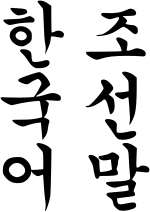lingvo.wikisort.org - Language
North Korean standard language or Munhwaŏ (Korean: 문화어; Hanja: 文化語; lit. "cultural language") is the North Korean standard version of the Korean language. Munhwaŏ was adopted as the standard in 1966. The adopting proclamation stated that the Pyongan dialect spoken in the North Korean capital Pyongyang and its surroundings should be the basis for Munhwaŏ; however, in practice, Iksop Lee and S. Robert Ramsey report that Munhwaŏ remains "firmly rooted" in the Seoul dialect, which had been the national standard for centuries. Most differences between the North and South Korean standards are thus attributable to replacement of Sino-Korean vocabulary and other loanwords with pure Korean words, or the Northern ideological preference for "the speech of the working class" which includes some words considered non-standard in the South.[1]
This article may be expanded with text translated from the corresponding article in Korean. (September 2014) Click [show] for important translation instructions.
|
| North Korean standard language | |
|---|---|
| 문화어 | |
| Native to | North Korea |
| Ethnicity | Koreans |
| Era | Second half of the 20th century and 21st century |
Language family | Koreanic languages
|
Early forms | Old Korean language
|
Writing system | Chosŏn'gŭl |
| Official status | |
Official language in | |
| Language codes | |
| ISO 639-3 | – |
| IETF | ko-KP |
| North Korean standard language | |||||||
|---|---|---|---|---|---|---|---|
| North Korean name | |||||||
| Chosŏn'gŭl | 문화어 | ||||||
| Hancha | 文化語 | ||||||
| |||||||
| South Korean name | |||||||
| Hangul | 북한어 | ||||||
| Hanja | 北韓語 | ||||||
| |||||||
Background
Following the liberation of Korea in 1945, the People Republic of Korea continued to follow the Korean language guidelines as defined by the Korean Language Society in 1933 with the "Proposal for Unified Korean Orthography" (한글 맞춤법 통일안) and in 1936 with the "Collection of Assessed Standard Korean Words" (사정한 조선어 표준말 모음). In 1954, the 1933 proposal was replaced by a new system (조선어 철자법) by the North Korean government in which thirteen words were slightly modified. Although the reformation created little difference, from this point the languages spoken by people on both sides on the Korean peninsula only grew in difference.
During the emergence of the Juche idea in the 1960s, Kim Il-sung coordinated an effort to purify the Korean language from English, Japanese, and Russian loanwords as well as words with less common Hancha characters, replacing them with new words derived from native Korean words. In a lecture by Kim Il-sung on 3 January 1964, titled "Some problems to develop the Korean language" (조선어를 발전시키 위한 몇가지 문제), he emphasized the significance of the usage of language as a weapon in the socialist construction of all areas of development, and tried to align with the global trend of change as well as preserving ethnic uniqueness.[2]
Thus, North Korea began to refer to its own dialect as "cultural language" (문화어) as a reference to its return to words of Korean cultural origin, in juxtaposition to South Korea's reference to its own dialect as "standard language" (표준어).
See also
References
- Lee, Iksop; Ramsey, S. Robert (2000). The Korean Language. SUNY Press. p. 309. ISBN 978-0-7914-4831-1.
- 남북한언어비교 분단시대의 민족어 통일을 위하여. nokjin. 1989.
Другой контент может иметь иную лицензию. Перед использованием материалов сайта WikiSort.org внимательно изучите правила лицензирования конкретных элементов наполнения сайта.
WikiSort.org - проект по пересортировке и дополнению контента Википедии
